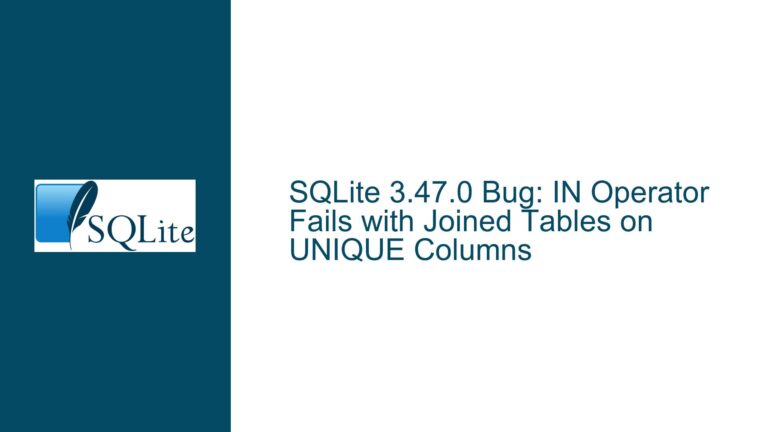SQLite’s CURRENT_TIME Keyword and Column Name Conflicts
Issue Overview: Misinterpretation of CURRENT_TIME in SQLite Queries
In SQLite, the CURRENT_TIME keyword is a built-in function that returns the current time in the format HH:MM:SS. This keyword is part of SQLite’s date and time functions, which also include CURRENT_DATE and CURRENT_TIMESTAMP. These functions are designed to provide the current date, time, or timestamp at the moment the query is executed. However, when a column in a table is named Current_Time, conflicts can arise due to the case-insensitive nature of SQLite’s keyword recognition.
In the provided scenario, the user has a table named data with a column named Current_Time. When the user executes a query like SELECT Current_Time FROM data;, SQLite interprets Current_Time as the keyword CURRENT_TIME rather than the column name. This results in the query returning the current time at the moment of execution for every row in the table, rather than the values stored in the Current_Time column.
This behavior is particularly confusing because SQLite is case-insensitive when it comes to keywords and identifiers. This means that Current_Time, current_time, and CURRENT_TIME are all treated the same way by SQLite. As a result, the query SELECT Current_Time FROM data; does not return the expected column values but instead returns the current time for each row.
Possible Causes: SQLite’s Case-Insensitive Keyword Handling and Column Naming Conflicts
The root cause of this issue lies in SQLite’s handling of keywords and identifiers. SQLite is designed to be case-insensitive when it comes to keywords and identifiers, which means that it does not distinguish between Current_Time, current_time, and CURRENT_TIME. This design choice is intended to make SQLite more user-friendly and flexible, but it can lead to unexpected behavior when column names conflict with SQLite’s reserved keywords.
In this case, the column name Current_Time conflicts with the SQLite keyword CURRENT_TIME. When the user executes a query that references Current_Time, SQLite interprets it as the keyword CURRENT_TIME rather than the column name. This is because SQLite’s parser first checks if the identifier matches any of its reserved keywords before checking if it matches a column name in the table.
Another contributing factor is the lack of explicit syntax to distinguish between keywords and column names in SQLite. In some other SQL databases, you can use double quotes or square brackets to explicitly indicate that an identifier is a column name, but SQLite’s syntax does not provide a clear way to do this. As a result, when a column name conflicts with a keyword, SQLite defaults to interpreting the identifier as the keyword.
Troubleshooting Steps, Solutions & Fixes: Resolving Column Name and Keyword Conflicts in SQLite
To resolve the issue of column names conflicting with SQLite keywords, there are several approaches that can be taken. The most straightforward solution is to rename the column to avoid the conflict. However, if renaming the column is not an option, there are other techniques that can be used to ensure that SQLite interprets the identifier as a column name rather than a keyword.
1. Renaming the Column to Avoid Conflicts
The simplest and most effective solution is to rename the column to something that does not conflict with any SQLite keywords. For example, the column Current_Time could be renamed to Recorded_Time or Time_Stamp. This approach eliminates the conflict entirely and ensures that queries referencing the column will return the expected results.
To rename the column, you can use the ALTER TABLE command in SQLite. However, SQLite’s ALTER TABLE command has limited functionality and does not support renaming columns directly. Instead, you will need to create a new table with the desired column names, copy the data from the old table to the new table, drop the old table, and then rename the new table to the original table name. Here is an example of how to do this:
-- Step 1: Create a new table with the desired column names
CREATE TABLE new_data (
id INTEGER PRIMARY KEY,
Recorded_Time REAL,
User_Name TEXT,
Info TEXT
);
-- Step 2: Copy data from the old table to the new table
INSERT INTO new_data (id, Recorded_Time, User_Name, Info)
SELECT id, Current_Time, User_Name, Info FROM data;
-- Step 3: Drop the old table
DROP TABLE data;
-- Step 4: Rename the new table to the original table name
ALTER TABLE new_data RENAME TO data;
2. Using Double Quotes to Explicitly Reference Column Names
If renaming the column is not an option, you can use double quotes to explicitly indicate that the identifier is a column name rather than a keyword. In SQLite, identifiers that are enclosed in double quotes are treated as column names, even if they match a reserved keyword. For example, you can modify the query to use double quotes around the column name:
SELECT "Current_Time" FROM data;
This query will return the values stored in the Current_Time column rather than the current time at the moment of execution. Note that the double quotes must be used consistently in all queries that reference the column. If you omit the double quotes in any query, SQLite will interpret Current_Time as the keyword CURRENT_TIME.
3. Using Table Aliases to Disambiguate Column Names
Another approach is to use table aliases to disambiguate column names. By assigning an alias to the table in the query, you can prefix the column name with the alias to ensure that SQLite interprets it as a column name rather than a keyword. For example:
SELECT d.Current_Time FROM data AS d;
In this query, the alias d is assigned to the data table, and the column name Current_Time is prefixed with the alias. This makes it clear to SQLite that Current_Time is a column name rather than a keyword. This approach can be particularly useful in complex queries that involve multiple tables or subqueries.
4. Using the ROWID Column to Avoid Conflicts
In some cases, you may be able to use SQLite’s built-in ROWID column to avoid conflicts with keywords. The ROWID column is a unique identifier for each row in a table, and it is automatically created by SQLite for every table (unless the table is defined with a WITHOUT ROWID clause). By using the ROWID column, you can avoid naming conflicts with keywords. For example:
SELECT ROWID, "Current_Time" FROM data;
In this query, the ROWID column is used to uniquely identify each row, and the Current_Time column is explicitly referenced using double quotes. This approach can be useful if you need to avoid conflicts with keywords while still maintaining a unique identifier for each row.
5. Using the IFNULL Function to Handle Null Values
If the Current_Time column contains null values, you can use the IFNULL function to handle them. The IFNULL function returns the first argument if it is not null, and the second argument if the first argument is null. For example:
SELECT IFNULL("Current_Time", 'N/A') FROM data;
In this query, the IFNULL function is used to return the value of the Current_Time column if it is not null, and the string 'N/A' if it is null. This approach can be useful if you need to handle null values in the Current_Time column while avoiding conflicts with the CURRENT_TIME keyword.
6. Using the COALESCE Function to Handle Multiple Columns
If you need to handle multiple columns that may contain null values, you can use the COALESCE function. The COALESCE function returns the first non-null value in its argument list. For example:
SELECT COALESCE("Current_Time", User_Name, 'N/A') FROM data;
In this query, the COALESCE function is used to return the value of the Current_Time column if it is not null, the value of the User_Name column if Current_Time is null, and the string 'N/A' if both columns are null. This approach can be useful if you need to handle multiple columns that may contain null values while avoiding conflicts with the CURRENT_TIME keyword.
7. Using the CASE Statement to Handle Complex Logic
If you need to handle more complex logic, you can use the CASE statement. The CASE statement allows you to define conditional logic in your queries. For example:
SELECT
CASE
WHEN "Current_Time" IS NULL THEN 'N/A'
ELSE "Current_Time"
END AS Recorded_Time
FROM data;
In this query, the CASE statement is used to return the string 'N/A' if the Current_Time column is null, and the value of the Current_Time column if it is not null. This approach can be useful if you need to handle complex logic while avoiding conflicts with the CURRENT_TIME keyword.
8. Using Views to Simplify Queries
If you frequently need to reference the Current_Time column in your queries, you can create a view that explicitly references the column using double quotes. A view is a virtual table that is defined by a query. For example:
CREATE VIEW data_view AS
SELECT id, "Current_Time" AS Recorded_Time, User_Name, Info FROM data;
In this view, the Current_Time column is explicitly referenced using double quotes and given an alias of Recorded_Time. You can then query the view instead of the original table:
SELECT Recorded_Time FROM data_view;
This approach can simplify your queries and ensure that the Current_Time column is always referenced correctly.
9. Using Triggers to Automate Column Renaming
If you need to automate the process of renaming the Current_Time column, you can use triggers. A trigger is a database object that automatically executes a specified action when a certain event occurs. For example, you can create a trigger that renames the Current_Time column whenever a new row is inserted into the table:
CREATE TRIGGER rename_current_time
AFTER INSERT ON data
BEGIN
UPDATE data SET "Current_Time" = NEW."Current_Time" WHERE id = NEW.id;
END;
In this trigger, the Current_Time column is explicitly referenced using double quotes. This ensures that the column is always referenced correctly, even if it conflicts with the CURRENT_TIME keyword.
10. Using Prepared Statements to Avoid Keyword Conflicts
If you are using SQLite in an application, you can use prepared statements to avoid keyword conflicts. A prepared statement is a precompiled SQL statement that can be executed multiple times with different parameters. By using prepared statements, you can ensure that column names are always referenced correctly, even if they conflict with SQLite keywords. For example, in Python using the sqlite3 module:
import sqlite3
conn = sqlite3.connect('new.db')
cursor = conn.cursor()
# Use a prepared statement to avoid keyword conflicts
cursor.execute('SELECT "Current_Time" FROM data')
rows = cursor.fetchall()
for row in rows:
print(row)
conn.close()
In this example, the Current_Time column is explicitly referenced using double quotes in the prepared statement. This ensures that the column is always referenced correctly, even if it conflicts with the CURRENT_TIME keyword.
Conclusion
In summary, the issue of column names conflicting with SQLite keywords can be resolved using a variety of techniques, including renaming the column, using double quotes to explicitly reference column names, using table aliases, and using views or triggers to automate the process. By understanding the nuances of SQLite’s keyword handling and column naming conventions, you can avoid unexpected behavior and ensure that your queries return the expected results.






